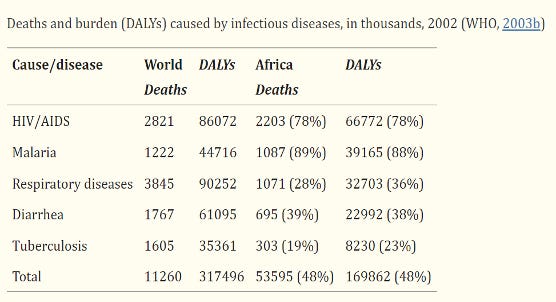The Underdeveloped Healthcare System in Africa
By Linh Anh Hoang Tran, GRC 2023 Global Essay Competition Top 30
“Africa’s problem is not its own,” said Paul Epstein, associate director of the Center for Health and Global Environment at Harvard Medical School. This claim was expressed rather clearly regarding the uncontrollable spread of infectious illnesses in Africa. Since the mid-1970s, the globe has witnessed the return of deadly illnesses like cholera and malaria, as well as the birth of thirty new infectious diseases, many of which originated on the African continent. The inadequate healthcare system is the primary cause of this concerning situation, which in turn contributes to the sharp rise in confirmed cases and deaths both inside and outside of the continent. As a result, it is a worldwide issue with grave consequences that calls for the assistance of powerful individuals and institutions in addition to innovative technological solutions.
Despite ongoing efforts to improve healthcare in Africa, the continent continues to have poor medical services and lacks the necessary infrastructure and personnel to meet the increasing demand for healthcare. With the data of only one doctor for every 10,000 people on average by Mustard Insights[1], there is a shortage of medical professionals to provide necessary treatments. As thousands of cases of various diseases are confirmed daily, the situation is becoming increasingly dire since most fail to get what is needed to survive. The efforts of medical professionals in Africa, though being appreciated, are unquestionably insufficient to save a nation, not to mention a continent, and, on a wider scale, the world. Additionally, the healthcare system cannot effectively treat infectious diseases that cross national boundaries due to inadequate facilities for the production, storage, and transportation of medications and vaccinations and a lack of basic amenities like power and clean water. Furthermore, there are less than 400 pharmaceutical companies on the continent to serve more than 1 billion people, making it impossible for people to obtain medicine for proper treatments, hence spreading diseases to others. This underscores the importance of finding a solution to tackle the illnesses that are spreading unregulated every day.
An underdeveloped healthcare system not only leads to high death rates but also causes harm to social and economic sectors across the continent. According to the National Library of Medicine of the US government, Africa contributed to 78% of deaths from AIDS in 2002. This data shows how the continent was severely lacking in the ability to save its population with proper treatments, leading to social consequences. In Sub-Saharan Africa alone, there are 14 million AIDS orphans who will be left on the street struggling to find a future if their relatives cannot take care of them. Moreover, a weak healthcare system hampers economic development by reducing productivity and diverting government funds from infrastructure and foreign investments. HIV/AIDS kills and disables adults in their prime working years, affecting the sustainability of all work fields. These effects extend beyond the borders of the continent, as a huge loss of labor force will lead to insufficient support for production lines in multiple industries, further causing a shortage of goods worldwide and corrupted money flow.
To address these challenges, there is a pressing need for contemporary solutions that go beyond traditional approaches. Besides governments calling for investments in healthcare infrastructure in the long run, artificial intelligence (AI) emerges as a promising tool in the fight against infectious diseases. AI's ability to process vast amounts of data and quickly diagnose patients makes it a valuable asset in improving laboratory operations. Infectious illness laboratory diagnosis in Africa is still based on antiquated techniques that may overlook latent and newly developing infections. AI in diagnostic microbiology, however, has the potential to enhance clinical decision-making, decrease turnaround times, and raise pathogen detection rates. It might be used to read bacterial culture plates and analyze photos of parasites. That said, it can assist in eliminating inconsistent findings and obtaining a more reliable diagnosis faster, resulting in the capability of treating more patients with a limited number of doctors. However, it is crucial to emphasize that AI should complement human involvement rather than replace it, as a collaborative approach is essential for addressing the multifaceted nature of the healthcare crisis.
In conclusion, Africa's healthcare predicament is a global challenge that demands urgent attention and collaborative efforts. The inadequacies in the healthcare system contribute to the rapid spread of infectious diseases, posing severe consequences for the continent and the world at large. While AI presents a promising technological solution, it must be integrated with human expertise and involve collaboration among individuals, academic institutions, non-governmental organizations, community groups, and health decision-makers. By working together to decrease the occurrence of diseases, prevent epidemics, and enhance resource management, a more resilient and effective healthcare system can be built to address the pressing health challenges in Africa and safeguard global well-being.
References
1. Boutayeb, A. (2010). The Impact of Infectious Diseases on the Development of Africa. Handbook of Disease Burdens and Quality of Life Measures, 1171-1188. https://doi.org/10.1007/978-0-387-78665-0_66
2. Kumar, Y., Koul, A., Singla, R., & Ijaz, M. F. (2023). Artificial intelligence in disease diagnosis: A systematic literature review, synthesizing framework and future research agenda. Journal of Ambient Intelligence and Humanized Computing, 14(7), 8459-8486. https://doi.org/10.1007/s12652-021-03612-z
3. Otaigbe, I. (2022). Scaling up artificial intelligence to curb infectious diseases in Africa. Frontiers in Digital Health, 4. https://doi.org/10.3389/fdgth.2022.1030427
4. Charlene Laino, “Africa, the infectious continent”, NBC News, October 29, 2003, https://www.nbcnews.com/id/wbna3072106





